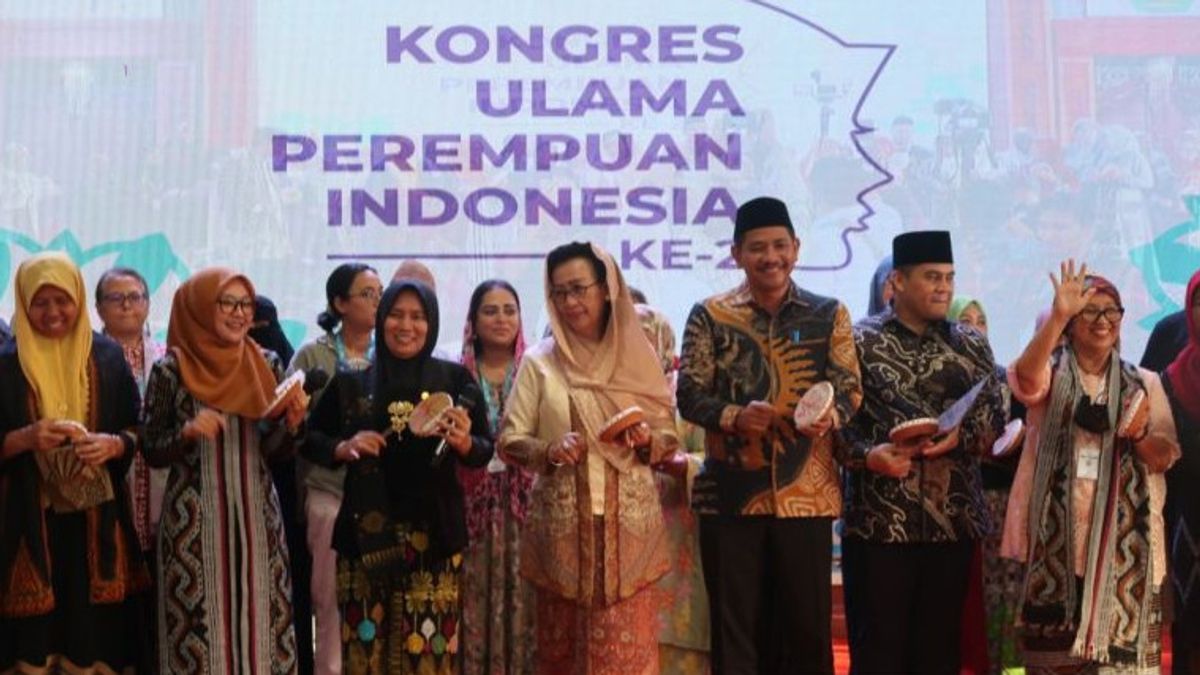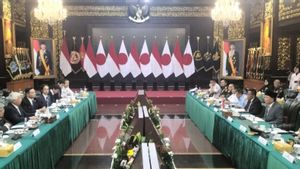JAKARTA - The second Indonesian Ulema Council (KUPI) resulted in eight recommendations submitted to stakeholders to be followed up and implemented with various policies that could protect the rights and create justice for women.
Chairman of the KUPI II Steering Committee Masruchah hopes that congress participants can share knowledge and records of recommendations for usual distribution to families, social spaces, and other spaces where they are.
"Our job is all part of the network of the Indonesian Women's Ulema Congress is to ensure how the knowledge gained here is divided into the spaces where we exist," he said when closing the congress activities at the Hasyim Asy'ari Islamic Boarding School, Jepara, Central Java, quoted from Antara, Saturday, November 26.
The congress took place at the Hasyim Asy'ari Islamic boarding school, Jepara, Central Java, on November 24-26 2022. This congress was attended by female clerics from 31 countries and hundreds of female clerics from various regions in Indonesia.
The first recommendation states that the recognition of the existence of female clerics has been accepted among the community, Islamic boarding schools, universities, government, media, and international circles.
Therefore, countries and civil society need to make female clerics a strategic partners in formulating policies and managing strategic national issues, starting from the central, regional, to villages or sub-district levels.
The second recommendation contains cases of violence against women, including rape, leading to women being cornered by pregnancy, stigma, and discrimination.
In that recommendation, female clerics asked the state to change and harmonize regulations that favor the safety and protection of women's souls and apply them consistently.
The state must also accelerate the preparation and implementation of various policies related to vulnerable violence groups, especially the implementing regulations of the Law on the Crime of Sexual Violence and the Bill on the Protection of Domestic Workers.
Female clerics also provide recommendations regarding waste problems and environmental sustainability, religious extremism, the practice of coercion of marriage, to encourage the growth of female clerical movements in various local communities in the world.
KUPI also calls for religious extremism to have a direct impact on the destruction of women's benefit, such as increasing violence against women in the name of religion.
They recommend that the state protect all citizens, both men and women from the dangers of extremism by strengthening the values of religious moderation.
The fifth recommendation contains a record of the practice of coercion of marriage and child marriage has been proven to be suffering in the survival of women and civilization. The female cleric asked the state to ensure the implementation of related regulations to stop the practice of coercion of child marriage and marriage.
Furthermore, the sixth recommendation contains the cutting and hugging of women's genetalia without medical reasons has proven to have a bad impact on women. They asked the state to adopt religious views that prohibit the practice of cutting and hugging women for no medical reason through the making of regulations and the stages of implementation.
The seventh recommendation contains solidarity for the Muslim community as stated in the fourth recommendation, especially women's groups in various countries experiencing humanitarian operations, especially in Afghanistan, Iran, Myanmar, Turkey and China (Uyghur).
Then, the latest recommendations encourage the growth of female clerical movements in various local communities of the world armed with the experience of female clerics as inspiration, where the movement of intra and interhealths, democracy, the involvement of men, and environmental justice is based on women's experience and knowledge.
Member of the DPD RI Gusti Kanjeng Ratu Hemas said his party would forward the recommendation to other members of parliament to be followed up into policy.
"This recommendation is indeed a topic that affects all of us, especially for women's society. This is where of course my hope for support for the implementation of KUPI II shows the presence of religious fatwas that are friendly to women," said Hemas.
Meanwhile, Expert Staff of the Minister of Religion for Law and Human Rights, Abu Rokhmad, said that the current women's clerical movement has become a strategic partner of the Ministry of Religion.
"Please continue to communicate so that we can collaborate with the Indonesian Women's Ulema Congress," he concluded.
The English, Chinese, Japanese, Arabic, and French versions are automatically generated by the AI. So there may still be inaccuracies in translating, please always see Indonesian as our main language. (system supported by DigitalSiber.id)













